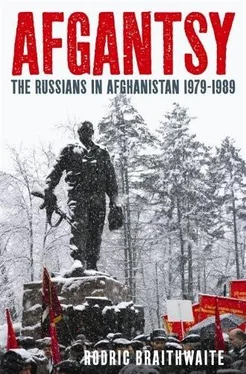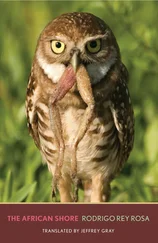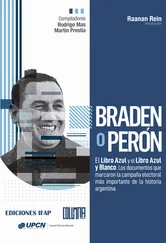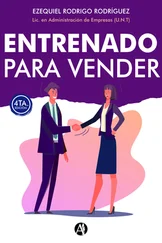3 D. Gai and V. Snegirev, Vtorzhenie (Moscow, 1991), p. 322; V. Snegirev, Ryzhy (Moscow, 2000), p. 157.
4 Gai and Snegirev, Vtorzhenie , p. 323.
5 Ibid., p. 361.
6 V. Kryuchkov, Lichnoe delo , 2 vols. (Moscow, 1996), p. 220; B. Padishev, ‘Najibullah, president Afghanistana’, International Affairs (Moscow), January 1990, p. 23, quoted in Kalinovsky, ‘A Long Goodbye’.
7 V. Snegirev in A. Belofastov and A. Rebrik (eds.), Mushavery (Moscow, 2005), p. 27.
8 A. Maiorov, Pravda ob afganskoi voine (Moscow, 1996), p. 117.
9 Gai and Snegirev, Vtorzhenie , p. 317.
10 Valeri and Galina Ivanov, interview, Moscow, 14 March 2010.
11 Maiorov, Pravda ob afganskoi voine , p. 110; Valeri Shiryaev, interview, Moscow, 12 March 2010.
12 I. Tukharinov, Sekretny komandarm ( http://www.rsva.ru/biblio/prose_af/secret_com/index.shtml); Valeri Shiryaev, interview, Moscow, 12 March 2010.
13 Kalinovsky, ‘The Blind Leading the Blind’.
14 Gai and Snegirev, Vtorzhenie , p. 317.
15 G. Kireev, Kandagarski dnevnik ( http://kireev.info/index.html).
16 Belofastov and Rebrik (eds.), Mushavery , p. 13.
17 Ibid., pp. 40 and 41.
18 Yevgeni Kiselev, interview, Moscow, 24 March 2010.
19 A. Greshnov, Afganistan: Zalozhniki vremeni (Moscow, 2006), pp. 26 and 27.
20 J. Van Bladel, The All-Volunteer Force in the Russian Mirror: Transformation without Change (Groningen, 2004).
21 A. Smolina, ‘Larisa-parikmakhersha’ ( http://artofwar.ru/s/smolina_a/text_0160.shtml).
22 One such case is mentioned in Gai and Snegirev, Vtorzhenie , p. 277.
23 A. Smolina, ‘Otvet “Afganki” dla avtorshi “Tsinkovykh Malchikov”’ ( http://artofwar.ru/s/smolina_a/text_0150.shtml).
24 Gai and Snegirev, Vtorzhenie , p. 284.
25 G. Krivosheev, Rossia i SSSR v voinakh XX veka: Poteri vooruzhennykh sil (Moscow, 2001), p. 537.
26 ‘Veterany boevykh deistvii NizhneKamsk’ ( http://www.afgankamsk.ucoz.ru/index/0–4).
27 Smolina, ‘Larisa-parikmakhersha’.
28 A. Smolina, ‘Medsestra Tatiana Kuzmina (1951–1986)’ ( http://artofwar.ru/s/smolina_a/).
29 A. Smolina, ‘Otvet “Afganki” dla avtorshi “Tsinkovykh Malchikov”’ ( http://artofwar.ru/s/smolina_a/text_0150.shtml).
30 S. Aleksievich, Zinky Boys (New York, 1992), p. 114.
31 A. Smolina, ‘Iz okoshka devichego modulya, ili vospominania “Afganok”’ ( http://artofwar.ru/s/smolina_a/text_0200.shtml).
32 Colonel Viktor Antonenko, interview, Moscow, 31 May 2007.
33 Aleksievich, Zinky Boys , p. 114.
34 Ibid., pp. 41 and 24.
35 Private information.
36 Alexander Khoroshavin posted his comments in the online ‘smoking room’ of the regiment on 25 June 2006 ( http://artofwar.ru/b/bobrow_g_1/kurilka860doc.shtml).
37 A tactic also adopted by women working in other circumstances, such as the intimate conditions of a long posting to a scientific research station in the Antarctic, where one or two women may be cooped up with their male colleagues for months at a time: conversation with Meredith Hooper, 17 May 2008.
38 A. Dyshev, PPZh: Pokhodno-polevaya Zhena (Moscow, 2007). The book’s verisimilitude is vouched for by Colonel Antonenko, Valeri Shiryaev, and Alexander Gergel.
39 Dmitri Fedorov, email to author, 25 July 2007.
40 Vyacheslav Nekrasov, interview, Moscow, 28 July 2009; V. Snegirev, ‘Nashi’, Rossiiskaya gazeta ( http://www.rg.ru/peoples/sneg/1.shtm).
41 Maiorov, Pravda ob afganskoi voine , pp. 145–8.
42 M. Yousaf and M. Adkin, Afghanistan: The Bear Trap (Barnsley, 1992), p. 146.
43 Gai and Snegirev, Vtorzhenie , pp. 317–18.
44 A. Smolina, ‘Nevezukha, ona i v Afgane—nevezukha’ ( http://artofwar.ru/s/smolina_a/).
45 Gai and Snegirev, Vtorzhenie , pp. 351–5.
46 Ibid., pp. 335–61.
47 Ibid., p. 320.
48 Belofastov and Rebrik (eds.), Mushavery , p. 59.
49 Alexander Yuriev, diary entry for 15–16 June 1985, ibid., p. 198.
50 Alexander Yuriev, diary entry for 10–12 August 1985, ibid., p. 203.
51 Ibid., p. 47.
52 Ibid., p. 19.
53 Ibid., p. 16.
54 Ibid., pp. 17 and 111 et seq.
55 Nikolai Komissarov, interview, Moscow, 26 July 2007.
56 Belofastov and Rebrik (eds.), Mushavery , p. 48.
57 Vyacheslav Nekrasov, interviews, Moscow, 2007–10.
58 Belofastov and Rebrik (eds.), Mushavery , pp. 130–34.
1 The best literary description of ‘soldiering’ comes in Frederic Manning’s The Middle Parts of Fortune (London, 2000), about the fighting on the Somme in 1916.
2 M. Galeotti, Afghanistan: The Soviet Union’s Last War (London, 1995), pp. 32–7.
3 Alexander Gergel, email to author, 28 July 2008.
4 A point made to me by Artemy Kalinovsky.
5 M. Reshetnikov, ‘Psikhofiziologicheskie osnovy prognozirovania effektivnosti boevoi deatelnosti i boevoi adaptatsii voennosluzhashchikh’: article kindly provided by Dr Reshetnikov.
6 Galeotti, Afghanistan , p. 30.
7 S. Aleksievich, Zinky Boys (New York, 1992), p. 27. There were similar stories at the beginning of the war in Chechnya.
8 V. Tamarov, Afghanistan: A Russian Soldier’s Story (Berkeley, CA, 2001), p. 138.
9 Andrei Ponomarev, interview, Moscow, 1 March 2010.
10 Vitali Krivenko gives a semi-fictionalised account of his time in Afghanistan in the first part of Ekipazh mashiny boevoi (‘The Crew of a Fighting Vehicle’) (St Petersburg, 2004), pp. 36–336. The second part of the book ( Kak pozhivaesh, shuravi? , pp. 336–80) is a memoir, from which these details of Krivenko’s career are drawn. On bullying, see p. 346.
11 A. Chernyaev, Sovmestny iskhod: Dnevnik dvukh epokh 1972–1991 gody (Moscow, 2008), diary entry for 27 August 1985, p. 643.
12 Sergei Morozov, interview, Moscow, 31 May 2007.
13 Krivenko, Ekipazh mashiny boevoi , p. 45; S. Nikiforov, Bez vsyakikh pravil (St Petersburg, 2008), p. 113.
14 A. Lyakhovski, Tragedia i doblest Afgana (Moscow, 1995) ( http://www.rsva.ru/biblio/prose_af/afgan_tragedy_and_glory/index.shtml).
15 The problem of dedovshchina and the need for professional NCOs are widely discussed. See, for example, S. Belanovski and S. Marzeeva, Dedovshchina v sovietskoi armii (Moscow, 1991) ( www.sbelan.ru/content/ - - - ); M. Radov, ‘ Dedovshchina —istoki i prichiny’ ( http://slovo.odessa.ua/366/5_4.html); I. Rodionov i, ‘Perestroiku armii nuzhno nachinat s serzhantov’ ( http://tr.rkrp-rpk.ru/get.php?42); Alexander Gergel, email to author, 24 June 2009.
16 Andrei Ponomarev, interview, Moscow, 1 March 2010.
17 The inadequacies are graphically spelled out by D. Gai and V. Snegirev, Vtorzhenie (Moscow, 1991), pp. 258–92.
18 S. Nikiforov, Bez vsyakikh pravil , p. 100.
19 G. Krivosheev, Rossia i SSSR v voinakh XX veka: Poteri vooruzhennykh sil (Moscow, 2001), p. 538.
20 A. Dyshev, PPZh: Pokhodno-Polevaya Zhena (Moscow, 2007), pp. 38–9.
21 B. Gromov, Ogranichenny kontingent (Moscow, 1994) ( http://www.rsva.ru/biblio/prose_af/limited_contingent/index.shtml).
22 Gai and Snegirev, Vtorzhenie , p. 273.
23 A. Smolina, ‘Kholera v Dzelalabade’ ( http://artofwar.ru/s/smolina_a/text_0070.shtml).
24 A. Smolina, ‘Larisa-parikmakhersha’ ( http://artofwar.ru/s/smolina_a/text_0160.shtml).
25 Galeotti, Afghanistan , pp. 67–8.
Читать дальше












